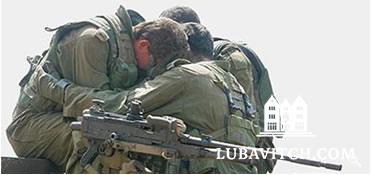The war in Israel is turning young kids into adults all too soon. Their physical wounds may heal, but the terror, blood and death will haunt their dreams for years. "I can’t sleep. The images of what happened keep me awake at night," said the young soldier.
2:00 Tuesday, Sheba Hospital, Tel Hashomer: Yoni, who turned 20 last week, is recovering from surgery. With bone fractures, burns and eye injuries from missile shrapnel, he’d lost a lot of blood and was taken to Ziv hospital in the north, before being transferred to Tel Hashomer. Yoni had three emergency surgeries in less than week, including a skin graft on his shoulder. He was in a lot of pain.
"The military classifies Yoni as ‘lightly wounded,’ his father, Binyamin, himself a retired general, tells me.
Between surgeries, Yoni described for his father the harrowing scene of his unit under attack while they staked out a building in Bint Jbail. He’d been hit, but was in good enough shape to help pull his seriously wounded comrades from the building. Under constant fire, he worked with the other soldiers until the last of the injured were evacuated to two tanks. A third and last tank came in, explains Binyamin, and the remaining soldiers climbed in, with Yoni and his commander hunkering down in a niche in the already full tank.
But before the armored vehicle could roll out of the danger zone, an anti-tank missile struck, killing Yoni’s commander instantly.
“I had a bad feeling that day,” says Binyamin. “So when I got the phone call from the army, I was relieved.” News of fatalities are never delivered to parents by phone.
5:00 Tuesday, Rannana: The magnitude of Roi Klein’s heroism inspires quiet awe. I join the Chabad representative to the city to make this shiva call. He chooses his words carefully as he speaks with the father of the now famous commander who jumped on a grenade to spare his soldiers at the battle in Bint Jbail. There is little that can be said in the presence of such courage.
“He cried out Shema Yisrael, and then jumped on the grenade," a traumatized 20-year old under Roi’s command told everyone. “He saved my life.”
On the civilian front, the stress is building. It’s been weeks now that people are living in shelters, their lives completely disrupted. Keeping the morale up for those who remain in Israel’s northern cities is a challenge that many Chabad representatives take personally.
Two minutes into my conversation with Yigal Tzipori, I hear thundering booms. This time, they’re outgoing rockets, coming from the vicinity where the IDF set up an artillery launcher.
Tzipori is the Chabad representative to Kiryat Shmona. His home is home to the soldiers in the area who shower, eat and sleep there whenever they get a chance. Today Tzipori is also the one-stop address for relief aid to the people that remained—mostly a poor segment of the population, many of them single parent families with no financial means or relatives to allow them to move to safer cities.
The shelters are hardly an alternative to life at home even if home is no more than a crowded two room hovel, but they are an alternative to the rain of Katyushas that lurk outside. So the adults bide their time in musty, unpleasant shelters where they have no privacy and are beginning to feel choked under the circumstances. But the children are climbing the walls. Invariably, and at certain risk, they come up for air and begin to play outside the shelter.
When Chabad volunteers recruited by Tzipori came to Kiryat Shmona last week, he gave them the job of occupying the children so they’d stay inside. With the promise of games and goodies, the children were pulled off the street and back down into the shelter. No sooner were they sitting down to a game and a Katyusha landed right outside on the pavement where the children were playing just a few minutes earlier.
“The miracles,” says Tzipori, “are as constant as the Katyushas that fall.”
Tzipori and the volunteers who come from yeshivas and kibbutzim to help him depend on miracles to do their work. Before the war, the Chabad soup kitchen in Kiryat Shmona served 500 meals daily. Today, the number has grown to 1200, which are delivered under the constant barrage of Katyushas city wide to the shelters and apartments where some people have refused to leave.
Kiryat Shmona has been emptied of more than 60 percent of its population, but Tzipori isn’t running. “The fear is real,” he concedes, “but there are still people here, and I can’t leave them.”
On the street in Kiryat Shmona, a two year old clings to his mother, but doesn’t make a sound, he doesn’t even blink at the sound of falling rockets. He’s on my hands all day," his mother says. "But he no longer says a word."

Be the first to write a comment.